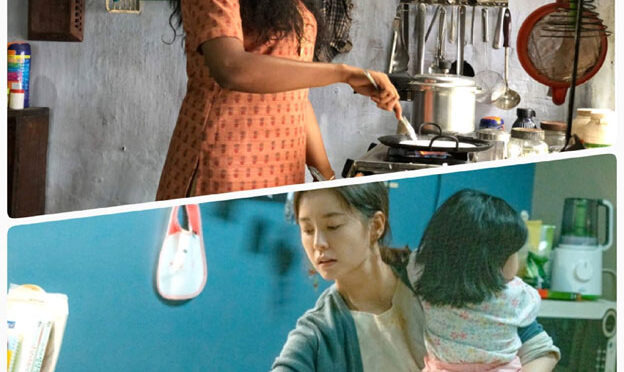Beyond the Kitchen: Exploring Female Personhood
Posted on : September 8, 2022Author : Suchandra Bhaduri

Films reviewed:
Great Indian Kitchen (2021) – Language- Malayalam Director: Joe Baby
Kim Ji-Young: Born 1982 (2019) – Language- Korean Director: Kim Do-Young
Abstract: The article contrasts two films, Joe Baby’s ‘The Great Indian Kitchen’ and Kim Do-Young’s ‘Kim Ji-Young: Born 1982’, to understand the plight of women within Asian society. While one movie is set in semi-urban Kerala, India, the other is set in Seoul, South Korea, yet the story of both these women have an uncanny similarity. Both women struggle in the kitchen and household, pressurized under societal norms and shackles of patriarchy. Ultimately, they rebel to establish their own identities. Even though these films and the story of these women are but minor ripples in a stagnant pool, it is but a step forward in the quest to find female personhood.
Keywords: Imprisonment, invisibility, patriarchy, women’s identity.
The late 20th century and 21st century all over Asia saw a greater female involvement in politics, economics, more women being educated and wanting employment. However, even within these signs of development, what is seen time and again is a traditionally perfected oppression in the garb of family-life and the responsibilities within the kitchen and household. This article tries to contrast women’s lives portrayed in the two films, one a Malayalam film named ‘The Great Indian Kitchen’ (2021), directed by Joe Baby, starring Nimisha Sajayan, Suraj Venjaramoodu in the lead roles, and Kim Ji-Young: Born 1982, a South-Korean film in 2019, based on a novel released in 2016 of the same name, directed by Kim Do-Young, starring Jung Yu-mi and Gong Yoo as the lead actors.
Homemaking becomes the subject of both the films, portraying the lives of the protagonist who is tied up with house-chores every day. The young Malayali woman in ‘The Great Indian Kitchen’ hails from an affluent urban family (father works abroad) is married to a school teacher residing in the outskirts of the city after they meet only once. Her life which surrounded itself with studies and dancing soon gets replaced with the duties in the kitchen. Her lifestyle, dreams, hobbies, routines and desires all are recast into the new ironclad framework of her husband’s family in a day. While her mother-in-law initially takes up most of the kitchen duties, her absence from the household burdens the protagonist completely. The cooking montages which initially looked like art, stimulating the viewers’ food cravings, soon becomes scenes where one feels a suffocation and empathy towards the character. Her life becomes surrounded by waste, dirt and dust and the umpteen sickening and stinking activities before cooking and after eating every single day. Not only are menus dictated, but the way in which they are to be cooked, clothes to be cleaned (without modern appliances) are advised as well through the film, burdening the young woman every step of the way. She enters the house from the main entrance among festivities, but the backdoor in the kitchen is what becomes her passage for the rest of the film. Her imprisonment within the house gets prominent as the film progresses, trapped within the walls of the kitchen, the bedroom and the small isolated room during her ‘impure’ menstruation cycles. In contrast, the husband does yoga every morning, the father-in-law not even brushing or wearing his shoes unless it is handed by the women in the house, signifying the stark differences in life and the leisure men seem to find within the household.
Kim Ji-Young, in the South-Korean movie, a housewife with a small child also is stuck in her mundane chores of cooking, cleaning, and caring for her child. Her small walks in the park with her daughter also become suffocating as office-goers taunt her as a ‘mom-worm’ for her poor dressing style and wasting her husband’s money on expensive coffee. A ‘mom-worm’ is supposed to stay at home, thus be invisible in society, which is exclaimed by a male urban young professional at a coffee shop later in the film, when Ji-Young spills coffee on the floor. Her holidays are spent at her in-law’s house, cooking big batches of food from dawn for all members of the family, while the others enjoy their leisure. Men cannot even draw a glass of water, set the table for dinner on their own, leaving the women, even daughters to do the chores from early age- to learn the tricks of domestic life. The attitude of society towards women is prominent when a doctor comments, ‘why is she having a hard life? When all the appliances do the work for her’. In another instance of Ji-Young’s sickness, her father and brother are unaware of what kind of bread she likes. These instances point out the lack of care and attention women often grew up in, the inferior social position women are put in, even in modern urban societies.
Responsibilities, expectations, culture, tradition, societal norms and the overarching frame of patriarchy boxes women’s lives and their identities throughout. Imprisonment and invisibility become recurring themes in these films, depicting the nature of most Asian societies. The Malayalam film consciously refrains from naming any of its characters, making it a universal story of most women in the country, while the Korean film names the protagonist Kim Ji-Young, one of the most common names in Korea. None of them are allowed to speak their mind about their desires, the former heckled for voicing her sexual desires, the latter silenced about her health and desire to work time and again. Both these films show a burst of emotions, and a struggle to break out from the shackles of society. On one hand, ‘The Great Indian Kitchen’ shows the woman raising her voice against religious practices on social media, applying for a job against the wishes of her family and ultimately rebelling to establish her own identity, Kim Ji-Young’s burst of madness throughout the film, channeling the voices of her mother and grandmother does the same. It is their urge to find themselves, that women in these films begin to challenge the institutions of marriage, family, religion which constantly thrive on erasing female agency and dignity. Simone de Beauvoir’s words, ‘He is the Subject, he is the Absolute- she is the other’, has defined women’s selfhood for generations throughout history. These films are but a glimpse of the struggle to address the questions about the self, to break the shackles of patriarchy.
Suchandra Bhaduri
Intern at Asia in Global Affairs
References
Chakrapani, A., 2021. Review: “The Great Indian Kitchen” Showcases the Subtle Suffering of Women in Indian Households. [Online]
Available at: https://www.cinemaescapist.com/2021/03/review-great-indian-kitchen-movie/
[Accessed 29 July 2022].
Fan, Y., 2021. Possession by Devil: Women’s Alternative Language; A Feminist Reading of Kim Ji-young, Born 1982. Feminist Media Studies.
Gen, A., 2021. Film Review: ‘Kim Ji-Young, Born 1982’ is a Jolting Revelation Of South Korea’s Unseen Misogyny. [Online]
Available at: https://www.sinema.sg/2021/06/10/film-review-kim-ji-young-born-1982/
[Accessed 06 August 2022].
Kim, H. E., 2019. Kim Ji-young, Born 1982: Feminist film reignites tensions in South Korea. [Online]
Available at: https://www.bbc.com/news/world-asia-50135152
[Accessed 07 August 2022].
PremkumarP, 2021. Feminist concern in Joe Baby’s The Great Indian Kitchen: A Feminist Reading. Journal of Emerging Technologies and Innovative Research, 8(9), pp. 44-47.
Stanford Encyclopedia of Philosophy, 2020. Feminist Perspective on the Self. [Online]
Available at: https://plato.stanford.edu/entries/feminism-self/
[Accessed 30 July 2021].
Venkiteswaran, C., 2021. Film review: ‘The Great Indian Kitchen’ discusses gender issues and patriarchal values in relationships. [Online]
Available at: https://frontline.thehindu.com/arts-and-culture/cinema/malayalam-indian-movie-the-great-indian-kitchen-film-review-kerala/article33765965.ece
[Accessed 29 July 2022].
Vetticad, A. M., 2021. The Great Indian Kitchen movie review: Startling, scathing, stunning take-down of patriarchy and its eternal sidekick, religion. [Online]
Available at: https://www.firstpost.com/entertainment/the-great-indian-kitchen-movie-review-startling-scathing-stunning-take-down-of-patriarchy-and-its-eternal-sidekick-religion-9213131.html
[Accessed 30 July 2022].





Great article.
An informative, enlightening and thought provoking piece. For a person who is without any idea about South Korean society this article provides the glimpses of that society. Enlightening in the sense that now it enables my mind to study and analyse Indian social issues from a broader perspective. Even minutes before reading this piece I have no clue about such societal similarities between two asian societies who are 5000 km apart. This article is thought provoking because it makes me feel that I should introspect my own behavior too, towards the female members of my family.
This seems to be the common plight of average women in rural households almost in all countries throughout Asia. The urban scene is somewhat different, especially among the educated women. The protagonists’ ultimate rebellion in these films are probably rare instances, if we go by the social oppression women still suffer on account of male supremacy.
In fine, your portrayal of the contrasting themes of the Indian and Korean films deserves praise.